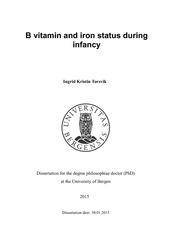| dc.contributor.author | Torsvik, Ingrid Kristin | en_US |
| dc.date.accessioned | 2015-05-20T08:29:49Z | |
| dc.date.available | 2015-05-20T08:29:49Z | |
| dc.date.issued | 2015-01-30 | eng |
| dc.identifier.isbn | 978-82-308-2723-9 | en_US |
| dc.identifier.uri | https://hdl.handle.net/1956/9902 | |
| dc.description.abstract | Adequate nutrition during infancy is essential to ensure normal growth and development. Since 2001, World Health Organization (WHO) has recommended exclusive breast-feeding for the first 6 months of life, which puts great nutritional demands on the mothers. Breast milk is important for the growing infant, but deficiency of both vitamins D and K have been well described in breastfed infants. There has also been concern about low levels of other micronutrients like iron, cobalamin (vitamin B12) and pyridoxal 5´-phosphate (PLP, the active form of vitamin B6), micronutrients that are important for brain development. Both cobalamin and iron deficiency may cause impaired psychomotor development with potential permanent intellectual defects. Gross motor function is an important marker of neurodevelopment in early infancy and known to be related to micronutrient status. The objectives of this thesis were to 1) investigate whether cobalamin supplementation can normalize the metabolic profile related to cobalamin status commonly observed in breastfed infants, 2) evaluate the effect of cobalamin supplementation in infants with developmental delay and /or feeding difficulties and biochemical signs of a moderate cobalamin deficiency and 3) investigate vitamin B and iron status in infants with a subnormal birth weight (BW) (2000-3000 grams (g)) during the first 6 months of life according to nutrition, and relate this to nutrition and gross motor development. The study included three populations with a total of 309 infants aged 6 weeks to 8 months, and their 298 mothers. These populations and main results are: 1. Healthy term infants with an appropriate BW for gestational age (AGA), n=107. Two-thirds of these mainly breastfed infants aged 1½ – 4 months had moderate cobalamin deficiency judged from total plasma homocysteine (tHcy) level > 6.5 μmol. In a randomized intervention study, cobalamin supplementation changed all markers of impaired cobalamin status toward a profile observed in cobalamin-replete older children and adults. 2. Infants less than 8 months, admitted to a pediatric outpatient clinic at Haukeland University Hospital due to feeding difficulties, subtle neurological symptoms and/or delayed psychomotor development, n=105. The majority of these infants, 80%, had indices of moderate cobalamin deficiency and a randomized intervention study showed that cobalamin supplementation resulted in significant improvements in regurgitations and motor skills compared to infants who were not supplemented. 3. Healthy infants with BW 2000-3000 g, n=97. In these infants with a suboptimal BW, formula feeding was associated with a better B vitamin status and better motor development at 6 months compared to infants who were mainly breastfeed. In infants with a BW ≤ 2500 g, iron supplementation resulted in an improved iron status at 6 months compared to non-supplemented infants with BW 2501 – 3000 g. A high weight gain, exclusively breastfeeding and male gender were associated with a poorer iron status in the non-supplemented infants. As B vitamins and iron play an important role in the development of the brain, an optimal nutrition during the first 6 months is important. Breast milk is important for the infant, but prolonged exclusive breastfeeding during a period characterized by rapid growth and development, may not provide sufficient B vitamins and iron for the infant, particularly for those with a suboptimal BW. We suggest that the recommendation of exclusive breastfeeding for 6 months needs to be reconsidered, and more data on micronutrient status in exclusively breastfed infants are warranted. | en_US |
| dc.language.iso | eng | eng |
| dc.publisher | The University of Bergen | eng |
| dc.relation.haspart | Paper I: Common metabolic profile in infants indicating impaired cobalamin status responds to cobalamin supplementation. Bjørke-Monsen AL, Ingrid Torsvik, Hege Sætran, Trond Markestad, Per Magne Ueland: Pediatrics 2008; Jul;122(1):83-91. The article is not available in BORA due to publisher restrictions. The published version is available at: <a href= "http://dx.doi.org/10.1542/peds.2007-2716" target="blank">http://dx.doi.org/10.1542/peds.2007-2716</a> | en_US |
| dc.relation.haspart | Paper II: Cobalamin supplementation improves motor development and regurgitations in infants: results from a randomized intervention study. Torsvik I, Ueland PM, Markestad T, Bjørke-Monsen AL: Am J Clin Nutr. 2013 Nov; 98(5):1233-40. The article is not available in BORA due to publisher restrictions. The published version is available at: <a href="http://dx.doi.org/10.3945/ajcn.113.061549" target="blank"> http://dx.doi.org/10.3945/ajcn.113.061549</a> | en_US |
| dc.relation.haspart | Paper III: B Vitamin status and motor development at 6 months are better in formula fed than breastfed infants with a birth weight between 2000-3000 g. Ingrid Kristin Torsvik, Trond Markestad, Per Magne Ueland, Øivind Midttun, Anne-Lise Bjørke Monsen. The article is not available in BORA. | en_US |
| dc.relation.haspart | Paper IV: Evaluating iron status and the risk of anemia in young infants using erythrocyte parameters.Torsvik IK, Markestad T, Ueland PM, Nilsen RM, Midttun O, Bjørke Monsen AL: Pediatr Res. 2013 Feb;73(2):214-20. The article is not available in BORA due to publisher restrictions. The published version is available at: <a href="http://www.nature.com/pr/journal/v73/n2/full/pr2012162a.html" target="blank">http://www.nature.com/pr/journal/v73/n2/full/pr2012162a.html</a> | en_US |
| dc.title | B vitamin and iron status during infancy | en_US |
| dc.type | Doctoral thesis | |
| dc.rights.holder | Copyright the author. All rights reserved | |
| dc.identifier.cristin | 1203812 | |
